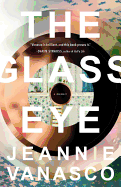
Jeannie Vanasco's The Glass Eye is an intense and unforgettable memoir, as fascinating for its artistry as for its subject matter. Jeannie was 18 when her father died. He had been her hero, her perfect person. On his deathbed, Jeannie promised him she would write about him. Although there is no sign that he heard, let alone held her to it, this promise would haunt the increasingly troubled young woman for years to come.
Her father had lost his left eye and wore a prosthetic one, which was in fact plastic, "but sometimes I call it glass. Glass implies the ability to be broken." He lost his left vocal cord, too, and her mother loses hearing in her left ear. "What will be left of me if I lose her?" Jeannie's father had a daughter before her, from an earlier marriage, who died in a car accident. That daughter was Jeanne; the daughter who promised to write this book is Jeannie, pronounced the same but with an added i. She fills her book with meditations on glass and left.
Vanasco pays compulsive attention to metaphors, and to the project of writing this memoir, which becomes a meta-exercise observing itself. She asks the professor in her memoir course, "What if it's about the promise to write the book?" Lyric, haunted, smart and tortured, this is an obsessive love letter to a dead father as well as a singular work of literature. The Glass Eye will attract memoir fans and readers concerned with mental illness and bereavement, as well as writers concerned with craft. --Julia Kastner, librarian and blogger at pagesofjulia

